 Petzlover
Petzlover Boerboel is originated from South Africa but Scotch Collie is originated from United Kingdom. Boerboel may grow 9 cm / 4 inches higher than Scotch Collie. Boerboel may weigh 58 kg / 128 pounds more than Scotch Collie. Boerboel may live 4 years less than Scotch Collie. Both Boerboel and Scotch Collie has almost same litter size. Boerboel requires Low Maintenance. But Scotch Collie requires Moderate Maintenance
Boerboel is originated from South Africa but Scotch Collie is originated from United Kingdom. Boerboel may grow 9 cm / 4 inches higher than Scotch Collie. Boerboel may weigh 58 kg / 128 pounds more than Scotch Collie. Boerboel may live 4 years less than Scotch Collie. Both Boerboel and Scotch Collie has almost same litter size. Boerboel requires Low Maintenance. But Scotch Collie requires Moderate Maintenance
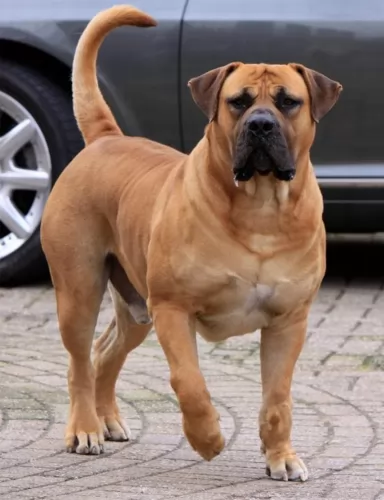 The name ‘Boerboel’ is derived from an Afrikaans/Dutch word, and the large Boerboel dog from South Africa has been specifically bred to be a farmer’s dog. Bred also to be a strong guard dog, the Boerboel is a mix of different African and European breeds, which in all likelihood, will include the Bullmastiff, the Rhodesian Ridgeback and the Bulldog. These dogs were used to hunt baboon and leopard.
The name ‘Boerboel’ is derived from an Afrikaans/Dutch word, and the large Boerboel dog from South Africa has been specifically bred to be a farmer’s dog. Bred also to be a strong guard dog, the Boerboel is a mix of different African and European breeds, which in all likelihood, will include the Bullmastiff, the Rhodesian Ridgeback and the Bulldog. These dogs were used to hunt baboon and leopard.
There is some information that suggests that the Boerboel was brought to South Africa by Jan van Riebeeck in 1652. Other information suggest that the dog is a descendant of the old Boer Hund, a powerful animal which was invaluable to the farmer.
In was in January 2010, that the American Boerboel Club was elected as the AKC’s Parent Club. The Boerboel was accepted into the Miscellaneous Class in the Working dog group.
 The landrace breed, which started in the highlands of Scotland is known as the Scotch Collie. There were at the time two types of collies – the Rough or long haired collie and the smooth or short haired collie. The Scotch Collie is considered to be from a line of very ancient herding dogs. It might have existed in the days of the Roman Empire, these herding dogs might have included the Native Celtic Dogs, Roman Cattle Dogs, Gordon Setter, Viking Herding Spitzes and Irish Setters.
The landrace breed, which started in the highlands of Scotland is known as the Scotch Collie. There were at the time two types of collies – the Rough or long haired collie and the smooth or short haired collie. The Scotch Collie is considered to be from a line of very ancient herding dogs. It might have existed in the days of the Roman Empire, these herding dogs might have included the Native Celtic Dogs, Roman Cattle Dogs, Gordon Setter, Viking Herding Spitzes and Irish Setters.
In its native land the Scotch Collie is often called the colley dogs, coaly and cooley. Collie comes from the Scottish words for black coal – or the Coaley Sheep they herded. In addition to herding, the Scotch Collie also acted as a hunter and guard dog for its family. A large group of these collies were exported to America to work on family farms. Soon they were so popular they became family pets. They were first shown in both England and America in in the mid to late 1800’s.
The Scotch Collie Club was formed in 1885 and the breed accepted into the AKC the same year. The Collie Club of America started the following year. The AKC eventually dropped the moniker Scotch in favor or Rough and Smooth Collie. This move also separated the show dogs from the still working/herding Scotch Collies.
Aa time went on and the collie became more prominent in conformation competitions, some breeders mixed in the Greyhound and perhaps the Borzoi to get the collie we see today. The Scotch Collie itself eventually lost its independent recognition in the UKC and the NKC. It was mixed in with the English Shepard, but it was an important element in the development of the Australian Shepard, Shetland Sheepdogs and Border Collies.
The breed had a revival of sorts in the early 2000’s as the Old Time Scotch Collie. Any type of farm collie in America and Canada can be registered in the OTSCA. They are more often referred to as Old Time Farm Shepherds to avoid confusion them with the very popular collies. In 2017 there were 174 of these OTSCA dogs. Collies today have less working instincts, and the heeling instinct seems to be gone.
Today the show version of the Scotch Collie is recognized by both the AKC and UKC in the herding group.
It has been said of the Scotch Collie that they have “the majesty of a lion, the pride of a great thoroughbred stallion, the confidence of a Winston Churchill.”
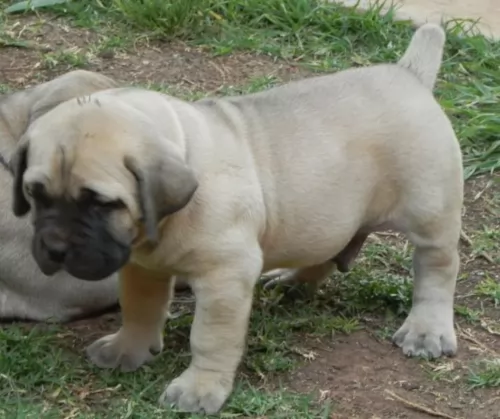 The Boerboel is a big, strong dog with powerful muscles. His height is between 61 – 66cm. He is similar looking to the Boxer dog, just heavier and bigger. The head of the dog is broad and big and the short, smooth coat can be of various shades, with breeders trying to achieve a single color of light tan and with no white. Their coats can also be red, different shades of brown and brindle.
The Boerboel is a big, strong dog with powerful muscles. His height is between 61 – 66cm. He is similar looking to the Boxer dog, just heavier and bigger. The head of the dog is broad and big and the short, smooth coat can be of various shades, with breeders trying to achieve a single color of light tan and with no white. Their coats can also be red, different shades of brown and brindle.
The dog has a black facial mask and the eyes are brown with the ears being of medium length and floppy. The Boerboel’s tail has always been docked, but today breeders are keeping the tail long. Many Boerboel lovers object to this, saying it detracts from the distinctive look of the Boerboel.
The Boerboel can be a wonderfully loyal and loving pet to their owners. They are territorial dogs and suspicious of strangers. This is a dog where it is imperative that they receive training and socialization as a puppy. They have leanings towards being aggressive so they wouldn’t be recommended to first time dog owners, unless of course the first time owners are firm and strong.
Boerboels raised the right way can be gentle giants. They often get bad publicity as regards to aggression, but this is because of they way they have been raised. Boerboels have been bred to be tough and fearless and they make excellent watchdogs. When raised and trained correctly, they make awesome, devoted companions, even around children and other pets.
 This Scotch Collie is an athletic, intelligent, well-balanced and alert dog. This collie has no exaggerated features like the long nose/muzzle of the current collies. This Scotch Collie is sound in mind and body, a hard working dog. He is hearty and versatile. They are longer than they are tall. Their heads are moderate and the stoop is well defined. They have a wide, flat skull. Their lips are tight and they are fitted well.
This Scotch Collie is an athletic, intelligent, well-balanced and alert dog. This collie has no exaggerated features like the long nose/muzzle of the current collies. This Scotch Collie is sound in mind and body, a hard working dog. He is hearty and versatile. They are longer than they are tall. Their heads are moderate and the stoop is well defined. They have a wide, flat skull. Their lips are tight and they are fitted well.
Their ears are also moderate in size and pointed or partially erect. They should not have long or droopy ears. They have eyes that might be oblique, almond, and round. The eyes are usually brown and merles may have blue eyes. The breed has a deep chest, broad shoulders and a long tail. There are also some bobtails that occur naturally.
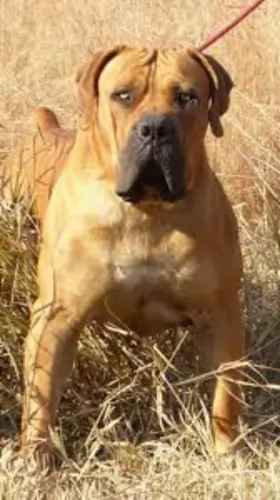 A well trained, socialized Boerboel makes a splendid pet. This is one breed known to have excellent guard- and watch dog characteristics. Boerboels are known for being protective when necessary. When not on guard, they make wonderful pets. He’ll need plenty of exercise, but he loves to also spend time indoors with his human family.
A well trained, socialized Boerboel makes a splendid pet. This is one breed known to have excellent guard- and watch dog characteristics. Boerboels are known for being protective when necessary. When not on guard, they make wonderful pets. He’ll need plenty of exercise, but he loves to also spend time indoors with his human family.
This a a bold, fearless dog who becomes devoted to his family. With the right training he is obedient and affectionate and knows how to behave appropriately indoors- and outdoors. For such a big dog, the African Boeboel’s temperament can be surprisingly gentle and affectionate around the family that he loves.
 3.Adaptability - Scotch Collies are versatile and adaptable. There is no need to crate them as they are not destructive. If you have a large run or kennel, they can live anywhere. However they are happiest on farms and open lands.
3.Adaptability - Scotch Collies are versatile and adaptable. There is no need to crate them as they are not destructive. If you have a large run or kennel, they can live anywhere. However they are happiest on farms and open lands.
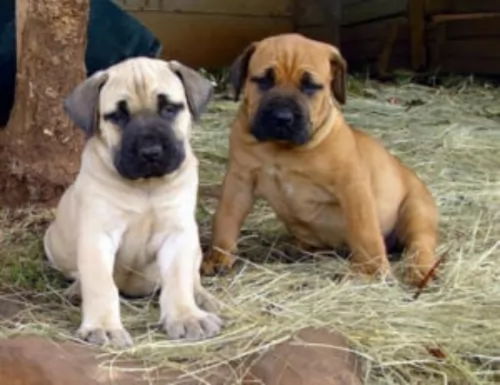 Many health problems experienced with any dog are found in the way dogs are fed, the way they are exercised and the way they are attended to when they are ill. Boerboels are healthy dogs and suffer fewer health defects than most similar breeds. The average life expectancy of a Boerboel is about 10 to 12 years. There are one or two health issues you’ll want to watch out for with your Boerboel.
Many health problems experienced with any dog are found in the way dogs are fed, the way they are exercised and the way they are attended to when they are ill. Boerboels are healthy dogs and suffer fewer health defects than most similar breeds. The average life expectancy of a Boerboel is about 10 to 12 years. There are one or two health issues you’ll want to watch out for with your Boerboel.
This aliment is typically found in large breed dogs. It’s a problem caused by a malformation of the hip joint. Over time hip dysplasia causes discomfort, pain and even arthritis and lameness. It is genetically inherited, with its severity being influenced by environmental factors. There are treatments available to alleviate the symptoms and make the dog more comfortable.
The Boerboel has plenty of muscle mass, and because he is such a large dog with a big appetite, he can lean towards obesity. Plenty of activities will be imperative to maintain muscle mass and ward off obesity. Over-eating suppresses the immune system, so over-feeding your dog simply contributes to ill health.
 The old line breed was hearty with few health issues. The ones they did have included:
The old line breed was hearty with few health issues. The ones they did have included:
• Skin problems - can have skin diseases like mange that may or may not be acute, may have allergies or sensitivities.
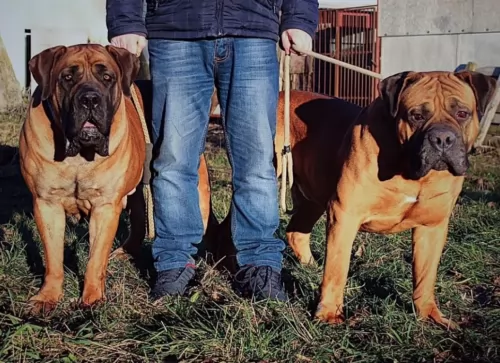 Boerboels are a robust breed and their short hair doesn’t shed heavily. Your Boerbul will require a thorough brushing twice a week to remove loose hair and to keep the coat shiny and healthy.
Boerboels are a robust breed and their short hair doesn’t shed heavily. Your Boerbul will require a thorough brushing twice a week to remove loose hair and to keep the coat shiny and healthy.
Boerboels, just like any other dog, should have their teeth brushed regularly to prevent tartar and plaque build-up. Left unattended, your pet can battle with tooth decay and gum disease.
Your Boerboel puppy will need ‘large breed puppy’ dog food. Speak to your veterinarian about wet- or dry kibble choices. An adult Boerboel will certainly need raw meat in his diet. When you do research, you find that the best Boerboel breeders are advocates for raw feeding. Home made food with rice, vegetables and meat as well as the best quality commercially manufactured dog foods for large breeds are excellent choices but raw meat is imperative as part of every dog’s diet.
 1Feeding the puppy - The Scotch Collie is not a medium dog nor is it a large dog. It is somewhere in-between. Because of this there is some discretion in not only how much you feed your puppy, but also what you feed. Normally we would feed according to breed size but here you need a high quality formula that is made for working breeds. The puppy will need enough calories to meet their high energy needs. Feed at least 3-4 times a day.
1Feeding the puppy - The Scotch Collie is not a medium dog nor is it a large dog. It is somewhere in-between. Because of this there is some discretion in not only how much you feed your puppy, but also what you feed. Normally we would feed according to breed size but here you need a high quality formula that is made for working breeds. The puppy will need enough calories to meet their high energy needs. Feed at least 3-4 times a day.
2.Feeding the adult - you need a high quality formula that is made for working breeds. The adult will need enough calories to meet their high energy needs. Feed at least 2 times a day.
There is a high need for exercise starting with walks or jog but that is not going to be enough. The Scotch Collie is not a Border Collie or a Corgi in terms of energy, but they are not couch potaoes. They need more than access to a yard. They need a job or they need defined exercise and play. The daily walk or jog will do it but intense play is better.